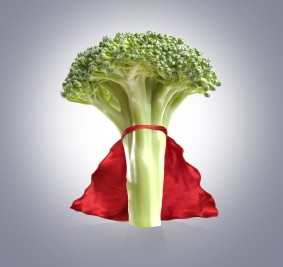 I have the taste of an eight year old. If I had my way, I’d probably exist on a diet of pizza, pretzels, ice cream, and chocolate, with maybe a really good burger and fries thrown in now and then.
I have the taste of an eight year old. If I had my way, I’d probably exist on a diet of pizza, pretzels, ice cream, and chocolate, with maybe a really good burger and fries thrown in now and then.
Unfortunately, those don’t any good for my health or my figure. So really, I do what I can to eat better: oatmeal for breakfast, fruit salad for lunch, no fast food, healthy(ish) snacks.
Recently I’ve been reading quite a bit about so-called “super foods”: things that you eat that are extra-special-super-duper healthy. This is tough, since chocolate is only mentioned once and pizza not at all. But you have to look at it this way: You put garbage in, you get garbage results. You put good stuff in……you get the drift.
It’s frustrating that I don’t love a plate of steamed broccoli the way I love a pint of Ben & Jerry’s. Maybe I just need a little bit of attitude adjustment: it’s not a sacrifice; it’s an opportunity for self improvement.
Ugh. Doesn’t sound great, does it?
Still, most of the foods that are super good aren’t all that bad to deal with. And if you like being healthy, then you’re gonna love what they do for your body:
1) Lemon: For years, my mom’s been starting the day with a glass of warm lemon water. I guess I can’t argue with success. She’s 85 and in excellent health, so I’ve been trying to follow her example. Lemon contains all sorts of good stuff: calcium, potassium, vitamin C, pectin fiber, iron, vitamin A. Plus it helps prevent constipation and diarrhea, and flushes out toxins. Some say it even boosts your immune system. I don’t know about that, but it seems pretty harmless, so why not?
2) Broccoli: The first President Bush was famous for hating broccoli, and though I’m not a huge fan either, I eat it all the same. Why? Research shows it can help prevent osteoporosis, protect your skin against UV light, reduce cancer risk, and detoxify air pollutants in the body. Sulforaphane in broccoli may also significantly improve blood pressure and kidney function, and may also stimulate a variety of antioxidant defense pathways in your body that can reduce oxidative stress and slow down immune system decline.
3) Blueberries: Summer is blueberry time, so this one is, if you’ll pardon the expression, a piece of cake (which I also love). Blueberries have the highest antioxidant capacity of any fresh fruit and can boost your immune system. What’s more, they can reduce belly fat, promote urinary tract health, and slow down vision loss. They’re also high in manganese, which plays an important role in bone development. A study published in the journal Free Radical Biology and Medicine suggests that blueberries reverse age-related memory loss, thanks to their abundance of antioxidants called flavonoids, which have been found to activate the parts of the brain that control memory and learning. Laboratory studies published n the Journal of Agricultural and Food Chemistry also show that the phenolic compounds in blueberries can inhibit colon cancer cell proliferation and induce apoptosis (programmed cell death). A significant 34 percent reduction in ovarian cancer risk was also seen in women with the highest intake of blueberry flavonoids flavone and luteolin.
4) Salmon: Salmon’s main health benefit is that it’s an excellent source of Omega-3 fatty acids, which can help lower bad cholesterol while increasing the kind that’s good. It can also help repair heart damage, strengthen heart muscles, lower blood pressure, and even prevent hardening of the arteries. Omega-3 fatty acids help your brain work better and improve memory. In conjunction with Vitamins A and D, amino acids, and selenium, these acids may also protect your nervous system from the deteriorating effects of aging.
5) Dark chocolate: Now this is something I can really get behind. Get this: In a 9-year Swedish study of more than 31,000 women, those who ate one or two servings of dark chocolate each week cut their risk for heart failure by as much as a third. And in a small Italian study, participants who ate a candy bar’s worth of dark chocolate once a day for 15 days saw their potential for insulin resistance drop by nearly half. This is great, too: chocolate and exercise work surprisingly well together: A recent study from Australia shows that eating chocolate high in healthy antioxidants reduced the blood pressure-raising effects of exercise on overweight individuals.
6) Potatoes: Lots of people stop eating potatoes when they’re trying to lose weight. But this is a mistake. If you want to lose weight, cut out the toppings — like butter and sour cream — but leave in the potatoes. Why? Potatoes are a rich carbohydrate source, so they help fuel the reactions you need for movement, thinking, digestion and cellular renewal. They’re also exceedingly rich in Vitamin B6, a substance needed for cellular renewal, a healthy nervous system and a balanced mood. And they can help reduce blood pressure.
7) Avocados: I really wish I liked avocados. Unfortunately, I don’t. Nonetheless, avocados are great for reducing the risk of inflammatory and degenerative disorders. They’re an excellent source of carotenoid lutein, which can help protect against age-related macular degeneration and cataracts. The monounsaturated (good) fats in avocados can reverse insulin resistance which helps to regulate blood sugar levels. And the high levels of folate in avocados may also protect against stroke. A study has shown that individuals who ate a diet rich in folate had a lower risk of stroke than those who did not .
8) Garlic: Yep, garlic is for more than just keeping away vampires (although that’s pretty awesome). Garlic strengthens the immune system and helps fight chest infections, coughs and congestion. It can also reduce cardiovascular disease and has high levels of iodine, which makes it a very effective treatment for hyperthyroid conditions.
9) Spinach: I don’t know about you, but when I think spinach, I automatically think Popeye. But maybe he was onto something. The possible health benefits of consuming spinach include improving blood glucose control in diabetics, lowering the risk of cancer, lowering blood pressure, improving bone health, lowering the risk of developing asthma, and more. Spinach is also high in fiber and water content, both of which help prevent constipation and promote a healthy digestive tract. It’s also high in vitamin A, which is necessary for sebum production to keep hair moisturized and for for the growth of all bodily tissues, including skin and hair.
10) Beans: Beans are comparable to meat when it comes to calories, but they really shine in terms of fiber and water content, two ingredients that make you feel fuller, faster. Adding beans to your diet helps cut calories without feeling deprived. And beans are high in antioxidants, a class of phytochemicals that incapacitate cell-damaging free radicals in the body.
So how many of these do you eat?



